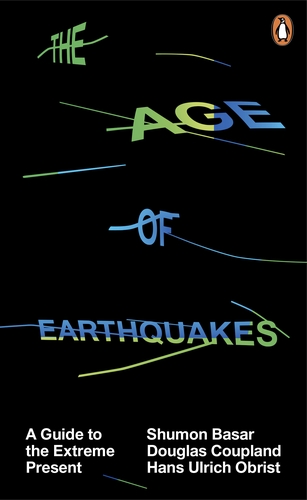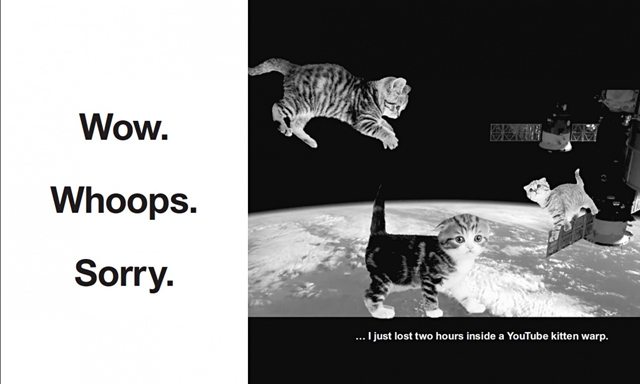Time, self and story
by Shumon Basar, Douglas Coupland and Hans Ulrich ObristFifty years after Marshall McLuhan’s ground-breaking The Medium is the Message, Shumon Basar, Douglas Coupland and Hans Ulrich Obrist examine the unstoppable impact of technology on contemporary culture. Touring a world redefined by the internet, decoding and explaining what they call the ‘extreme present’, The Age of Earthquakes harnesses the images, language and perceptions of our unfurling digital lives. Images and illustrations from over 30 contemporary artists are presented alongside textual borrowings from and reflections on our interconnected lives, and a glossary of new terms to describe how we are truly feeling today.
Here are some examples.
Narrative drive
(n.)
The belief that a life without a story is a life not worth living. Ironically accompanied by the fact that most people cannot ascribe a story to their lives.
Denarration
(n.)
The process whereby one’s life stops feeling like a story.
Time shrink
(n.)
Describes the way in which your perceived life shrinks when it becomes over-efficient from multi-tasking, and not enough down-gaps are left between specific experiences.
Interruption-driven memory
(n.)
We only remember red stoplights, never the green ones. The green ones keep us in the flow; the red ones interrupt and annoy us. Interruption. This accounts for the almost near-universal tendency of car drivers to be superstitious about stoplights.
Gap-induced time stretching
(n.)
Time perception is very much about how you sequence your activities, how many activities you layer over the top of others, and the types of gaps, if any, you leave in between activities. Leaving small gaps of inactive downtime between successive tasks has the long-term effect of making one’s life feel ‘longer’.
Time snack
(v.)
Often annoying moments of pseudo-leisure created by computers when they stop to save a file or to search for software updates or merely to mess with your mind.
Proceleration
(n.)
The acceleration of acceleration.
Humanalia
(n.)
Things made by humans that exist only on earth and nowhere else in the universe. Examples include Teflon, NutraSweet, thalidomide, Paxil and meaningfully sized chunks of element 43, Technetium.
Smupid
(adj.) smart + stupid
Smupidity defines the mental state wherein we acknowledge that we’ve never been smarter as individuals and yet somehow we’ve never felt stupider. We now collectively inhabit a state of smupidity. Example: “Yes, I know I was able to obtain a list of all Oscar winners from 1952 in three tenths of a second, yet it makes me feel smupid that I didn’t waste two hours visiting the local library to obtain that list.”
Stuart
(adj.) stupid + smart
We’ve all been in stuart situations yet have not had the word to describe it. Example: ‘Last month someone showed me a page of the Frankfurter Allgemeine Zeitung and I looked at the words on the paper and I kept waiting for the article to translate itself. I felt smupid.’ To be stuart is to tell a person: ‘I’m actually a very intelligent human being – unfortunately I’m without an Internet connection, and thus am unable to display said intelligence. So, yes, I’m feeling a bit stuart.’
Cyphoria
(n.) cyber + dysphoria
Cyphoria is the belief that the Internet is the real world.
Crisisis
(n.)
Being bored of global crises.
Deselfing
(n.)
Willingly diluting one’s sense of self and ego by plastering the Internet with as much information as possible.
Undeselfing
(n.)
(a.k.a. reselfing)
The attempt, usually frantic and futile, to reverse the deselfing process.
 This is an edited extract from The Age of Earthquakes: A Guide to the Extreme Present by Shumon Basar, Douglas Coupland and Hans Ulrich Obrist.
This is an edited extract from The Age of Earthquakes: A Guide to the Extreme Present by Shumon Basar, Douglas Coupland and Hans Ulrich Obrist.
Shumon Basar is the author of Do You Often Confuse Love with Success and with Fame? and his (co-)edited books include Drone Fiction, Translated By and Did Someone Say Participate? He’s had long-term engagements with Tank and Bidoun magazines; the AA School, London; the Global Art Forum, Dubai, and is now advising the Fondazione Prada, Milan.
Douglas Coupland is an author and visual artist known for the bestselling Generation A, JPod, All Families Are Psychotic, Microserfs, Generation X and eight other novels, along with non-fiction works including a short biography of Marshall McLuhan.
Hans Ulrich Obrist is an internationally renowned curator and writer. Since 2006 he has been co-director of the Serpentine Gallery, London. His previous books include Ai Weiwei Speaks and Ways of Curating.
The Age of Earthquakes is published by Penguin in paperback and eBook. Read more.


